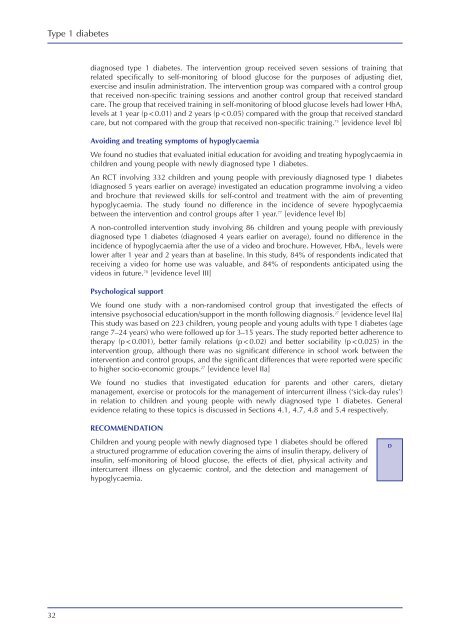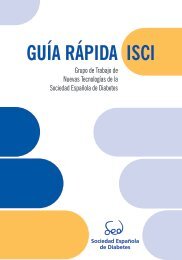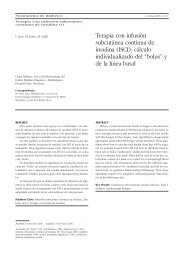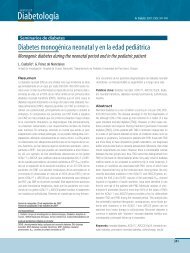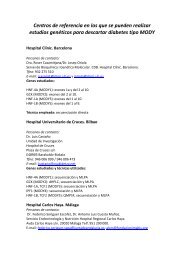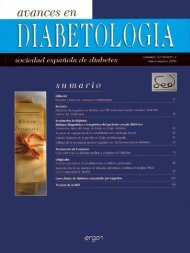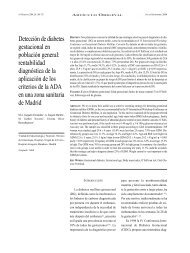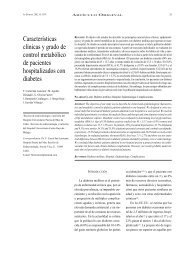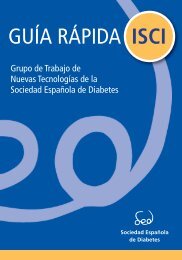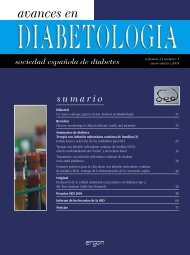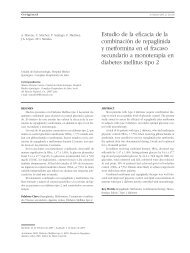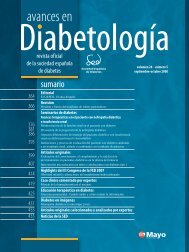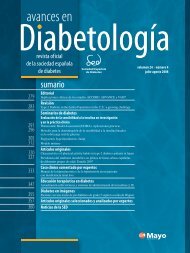You also want an ePaper? Increase the reach of your titles
YUMPU automatically turns print PDFs into web optimized ePapers that Google loves.
<strong>Type</strong> 1 <strong>diabetes</strong>diagnosed type 1 <strong>diabetes</strong>. The intervention group received seven sessions of training thatrelated specifically to self-monitoring of blood glucose for the purposes of adjusting diet,exercise and insulin administration. The intervention group was compared with a control groupthat received non-specific training sessions and another control group that received standardcare. The group that received training in self-monitoring of blood glucose levels had lower HbA 1levels at 1 year (p < 0.01) and 2 years (p < 0.05) compared with the group that received standardcare, but not compared with the group that received non-specific training. 75 [evidence level Ib]Avoiding and treating symptoms of hypoglycaemiaWe found no studies that evaluated initial education for avoiding and treating hypoglycaemia inchildren and young people with newly diagnosed type 1 <strong>diabetes</strong>.An RCT involving 332 children and young people with previously diagnosed type 1 <strong>diabetes</strong>(diagnosed 5 years earlier on average) investigated an education programme involving a videoand brochure that reviewed skills for self-control and treatment with the aim of preventinghypoglycaemia. The study found no difference in the incidence of severe hypoglycaemiabetween the intervention and control groups after 1 year. 77 [evidence level Ib]A non-controlled intervention study involving 86 children and young people with previouslydiagnosed type 1 <strong>diabetes</strong> (diagnosed 4 years earlier on average), found no difference in theincidence of hypoglycaemia after the use of a video and brochure. However, HbA 1c levels werelower after 1 year and 2 years than at baseline. In this study, 84% of respondents indicated thatreceiving a video for home use was valuable, and 84% of respondents anticipated using thevideos in future. 78 [evidence level III]Psychological supportWe found one study with a non-randomised control group that investigated the effects ofintensive psychosocial education/support in the month following diagnosis. 27 [evidence level IIa]This study was based on 223 children, young people and young adults with type 1 <strong>diabetes</strong> (agerange 7–24 years) who were followed up for 3–15 years. The study reported better adherence totherapy (p < 0.001), better family relations (p < 0.02) and better sociability (p < 0.025) in theintervention group, although there was no significant difference in school work between theintervention and control groups, and the significant differences that were reported were specificto higher socio-economic groups. 27 [evidence level IIa]We found no studies that investigated education for parents and other carers, dietarymanagement, exercise or protocols for the management of intercurrent illness (‘sick-day rules’)in relation to children and young people with newly diagnosed type 1 <strong>diabetes</strong>. Generalevidence relating to these topics is discussed in Sections 4.1, 4.7, 4.8 and 5.4 respectively.RECOMMENDATIONChildren and young people with newly diagnosed type 1 <strong>diabetes</strong> should be offereda structured programme of education covering the aims of insulin therapy, delivery ofinsulin, self-monitoring of blood glucose, the effects of diet, physical activity andintercurrent illness on glycaemic control, and the detection and management ofhypoglycaemia.D32


